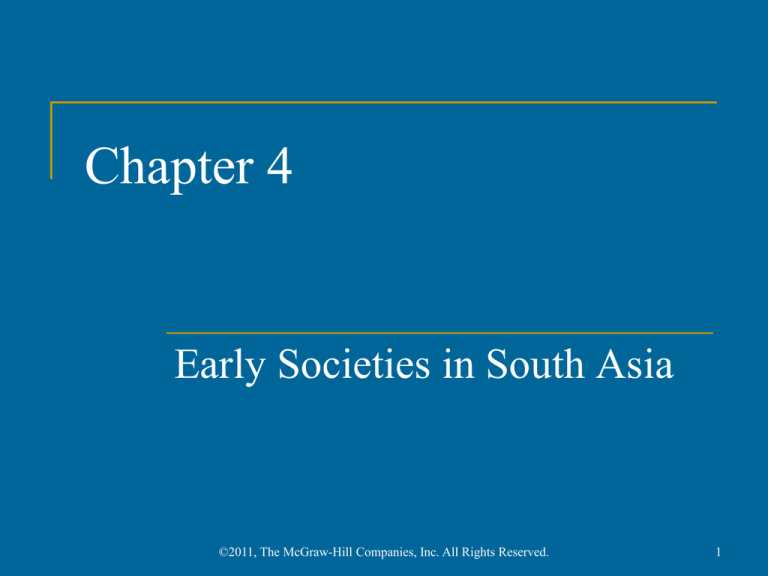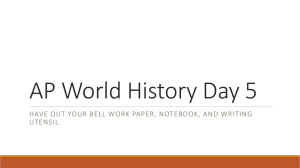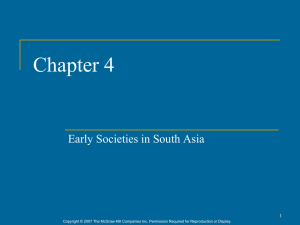
Chapter 4
Early Societies in South Asia
©2011, The McGraw-Hill Companies, Inc. All Rights Reserved.
1
Harappan Society and Its Neighbors,
ca. 2000 B.C.E.
©2011, The McGraw-Hill Companies, Inc. All Rights Reserved.
2
Foundations of Harappan Society
The Indus River
Major society built by Dravidian peoples, 30002500 B.C.E.
Silt-enriched water from mountain ranges
Cultivation of cotton before 5000 B.C.E., early
cultivation of poultry
Decline after 1900 B.C.E.
Major cities: Harappa (Punjab region) and
Mohenjo-daro (mouth of Indus River)
70 smaller sites excavated (total 1500)
©2011, The McGraw-Hill Companies, Inc. All Rights Reserved.
3
Mohenjo-Daro Ruins
Population about 40,000
Regional center
Layout, architecture suggests public purpose
Broad streets, citadel, pool, sewage
Standardized weights evident throughout region
Specialized labor
Trade
©2011, The McGraw-Hill Companies, Inc. All Rights Reserved.
4
Harappan Society and Culture
Evidence of social stratification
Dwelling size, decoration
Harappan civilization: influence on later Indian
culture
Statues, figurines, and illustrations reflect a
tradition of art and metallurgy
Venerated goddesses of fertility
©2011, The McGraw-Hill Companies, Inc. All Rights Reserved.
5
Mysterious End of Harappan Civilization
Reasons for disappearance unclear
Excessive deforestation, loss of topsoil
Earthquakes?
Flooding?
Evidence of unburied dead
Disappearance by 1500 B.C.E.
Harappan traditions survived – agricultural
practices, religious beliefs, and urban traditions
©2011, The McGraw-Hill Companies, Inc. All Rights Reserved.
6
The Early Aryans
Pastoral economy: sheep, goats, horses, cattle
Cattle not sacred until many centuries later
Religious and literary works: the Vedas
Sanskrit: sacred tongue
Prakrit: everyday language, evolved into Hindi,
Urdu, Bengali
Four Vedas (wisdom), most important Rig Veda
1028 hymns to Aryan gods
©2011, The McGraw-Hill Companies, Inc. All Rights Reserved.
7
The Vedic Age
Conflicts between Aryans and indigenous dasas
(“enemies,” “subjects”)
Chiefdoms: rajas
Early concentration in Punjab, migrations further south
Aryans fighting Dravidians
Also Aryans fighting each other
Development of iron metallurgy
Increasing reliance on agriculture
Tribal connections evolve into political structures
©2011, The McGraw-Hill Companies, Inc. All Rights Reserved.
8
Varna: The Caste System
Origins in Aryan domination of Dravidians
Brahmin, priest
Kshatriya, warrior
Vaishya, merchant
Shudra, serf
“Untouchables”
Jati system of subcastes
Related to urbanization, increasing social and
economic complexity
©2011, The McGraw-Hill Companies, Inc. All Rights Reserved.
9
Patriarchy in Ancient Indian Society
“Rule of the father”
A social order that stood alongside the caste
system, and varna hierarchy
Enforced in the Lawbook of Manu
Women to be subject to fathers, husbands, sons
Women’s most important duties to bear children and
maintain wholesome homes
©2011, The McGraw-Hill Companies, Inc. All Rights Reserved.
10
Aryan Religion
Major deity of Rig Veda: Indra, war god
Elaborate ritual sacrifices to gods
Role of brahmins important
Ca. 800 B.C.E. some movement away from
sacrificial cults
Mystical thought, influenced by Dravidians
©2011, The McGraw-Hill Companies, Inc. All Rights Reserved.
11
Teachings of the Upanishads
Texts that represent blending of Aryan and
Dravidian traditions
Composed 800-400 B.C.E., some later collections
until thirteenth century C.E.
Brahman: the universal soul
Samsara: reincarnation
Karma: accounting for incarnations
Moksha: mystical ecstasy
Relationship to system of Varna
©2011, The McGraw-Hill Companies, Inc. All Rights Reserved.
12







